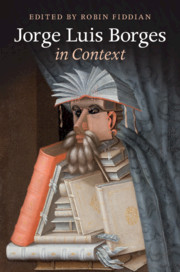
-
Select format
-
- Publisher:
- Cambridge University Press
- Publication date:
- January 2020
- January 2020
- ISBN:
- 9781108635981
- 9781108470445
- 9781108456050
- Dimensions:
- (228 x 152 mm)
- Weight & Pages:
- 0.57kg, 306 Pages
- Dimensions:
- (229 x 152 mm)
- Weight & Pages:
- 0.453kg, 308 Pages
You may already have access via personal or institutional login
Book description
Jorge Luis Borges (1899–1986) is Argentina's most celebrated author. This volume brings together for the first time the numerous contexts in which he lived and worked; from the history of the Borges family and that of modern Argentina, through two world wars, to events including the Cuban Revolution, military dictatorship, and the Falklands War. Borges' distinctive responses to the Western tradition, Cervantes and Shakespeare, Kafka, and the European avant garde are explored, along with his appraisals of Sarmiento, gauchesque literature and other strands of the Argentine cultural tradition. Borges' polemical stance on Catholic integralism in early twentieth-century Argentina is accounted for, whilst chapters on Buddhism, Judaism and landmarks of Persian literature illustrate Borges's engagement with the East. Finally, his legacy is visible in the literatures of the Americas, in European countries such as Italy and Portugal, and in the novels of J. M. Coetzee, representing the Global South.
Reviews
‘… this is an excellent, up-to-date study of the masterful Argentine writer.’
J. S. Bottaro Source: Choice
Contents
Metrics
Altmetric attention score
Full text views
Full text views help Loading metrics...
Loading metrics...
* Views captured on Cambridge Core between #date#. This data will be updated every 24 hours.
Usage data cannot currently be displayed.
Accessibility standard: Unknown
Why this information is here
This section outlines the accessibility features of this content - including support for screen readers, full keyboard navigation and high-contrast display options. This may not be relevant for you.
Accessibility Information
Accessibility compliance for the PDF of this book is currently unknown and may be updated in the future.


